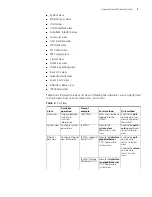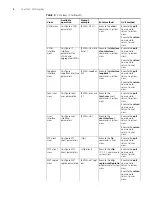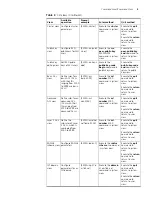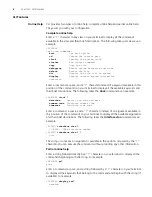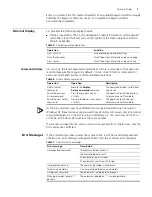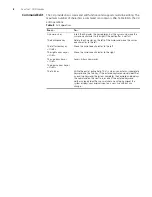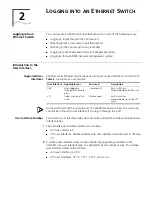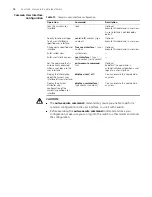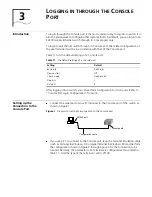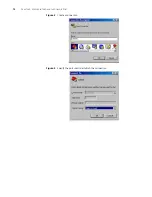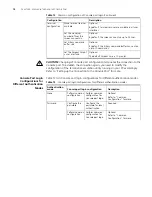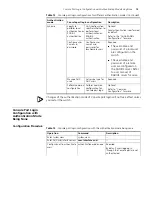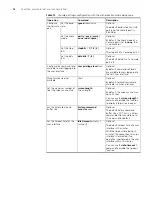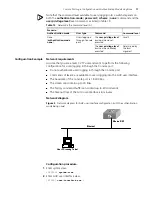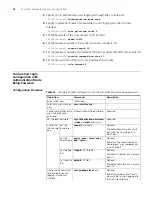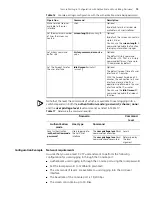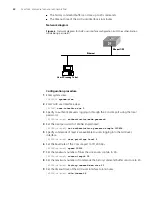
6
C
HAPTER
1: CLI O
VERVIEW
CLI Features
Online Help
CLI provides two types of online help: complete online help and partial online help.
They assist you with your configuration.
Complete online help
Enter a “?” character in any view on your terminal to display all the commands
available in the view and their brief descriptions. The following takes user view as an
example.
<S4200G> ?
User view commands:
boot
Set boot option
cd
Change the current path
clock
Specify the system clock
cluster
Run cluster command
copy
Copy the file
debugging
Enable system debugging functions
delete
Delete the file
dir
Display the file list in system
display
Display current system information
<omitted>
Enter a command, a space, and a “?” character (instead of a keyword available in this
position of the command) on your terminal to display all the available keywords and
their brief descriptions. The following takes the
clock
command as an example.
<S4200G>
clock ?
datetime
Specify the time and date
summer-time
Configure summer time
timezone
Configure time zone
Enter a command, a space, and a “?” character (instead of an argument available in
this position of the command) on your terminal to display all the available arguments
and their brief descriptions. The following takes the
interface vlan
command as an
example.
[4200G]
interface vlan ?
<1-4094> VLAN interface number
[4200G]
interface vlan 1 ?
<cr>
The string <cr> means no argument is available in the position occupied by the “?”
character. You can execute the command without providing any other information.
Partial online help
Enter a string followed directly by a “?” character on your terminal to display all the
commands beginning with the string. For example:
<S4200G>
pi?
ping
Enter a command, a space, and a string followed by a “?” character on your terminal
to display all the keywords that belong to the command and begin with the string (if
available). For example:
<S4200G>
display ver?
version
Summary of Contents for 4200G 12-Port
Page 10: ...8 CONTENTS...
Page 14: ...4 ABOUT THIS GUIDE...
Page 46: ...32 CHAPTER 5 LOGGING IN THROUGH WEB BASED NETWORK MANAGEMENT SYSTEM...
Page 48: ...34 CHAPTER 6 LOGGING IN THROUGH NMS...
Page 60: ...46 CHAPTER 9 VLAN CONFIGURATION...
Page 64: ...50 CHAPTER 10 MANAGEMENT VLAN CONFIGURATION...
Page 80: ...66 CHAPTER 13 GVRP CONFIGURATION...
Page 98: ...84 CHAPTER 15 LINK AGGREGATION CONFIGURATION...
Page 112: ...98 CHAPTER 18 MAC ADDRESS TABLE MANAGEMENT...
Page 126: ...112 CHAPTER 19 LOGGING IN THROUGH TELNET...
Page 162: ...148 CHAPTER 20 MSTP CONFIGURATION...
Page 274: ...260 CHAPTER 29 IGMP SNOOPING CONFIGURATION...
Page 276: ...262 CHAPTER 30 ROUTING PORT JOIN TO MULTICAST GROUP CONFIGURATION...
Page 298: ...284 CHAPTER 33 SNMP CONFIGURATION...
Page 304: ...290 CHAPTER 34 RMON CONFIGURATION...
Page 338: ...324 CHAPTER 36 SSH TERMINAL SERVICES...
Page 356: ...342 CHAPTER 38 FTP AND TFTP CONFIGURATION...
Page 365: ...Information Center Configuration Example 351 S4200G terminal logging...
Page 366: ...352 CHAPTER 39 INFORMATION CENTER...
Page 378: ...364 CHAPTER 40 BOOTROM AND HOST SOFTWARE LOADING...
Page 384: ...370 CHAPTER 41 Basic System Configuration and Debugging...
Page 388: ...374 CHAPTER 43 NETWORK CONNECTIVITY TEST...
Page 406: ...392 CHAPTER 45 CONFIGURATION OF NEWLY ADDED CLUSTER FUNCTIONS...












